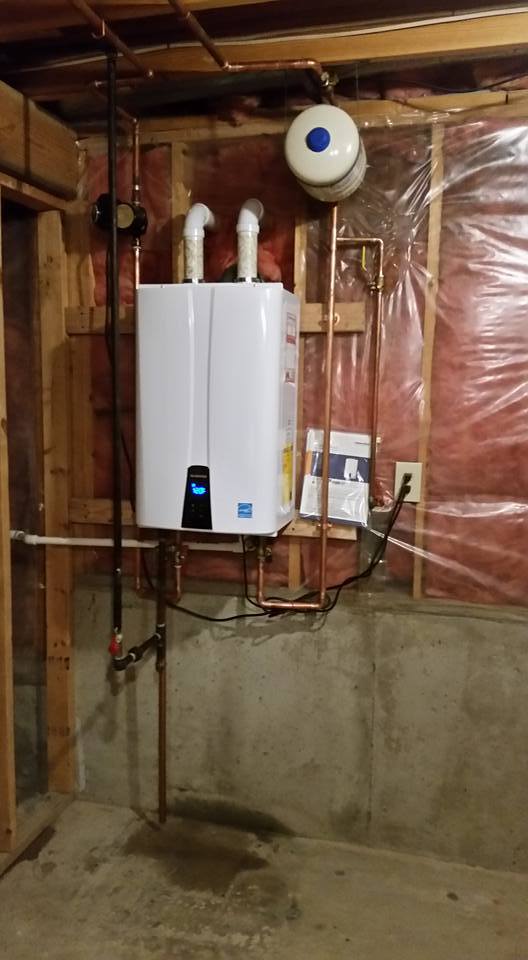Expert water heater installation in Brea – quality service guaranteed
Expert water heater installation in Brea – quality service guaranteed
Blog Article
How to Select the Right Hot Water Heater Installment for Your Home
Selecting the proper water heater installation for your home requires an extensive understanding of different aspects, including your family's details warm water demands and the types of heating units available. In addition, factors to consider around power effectiveness and setup expenses play an essential duty in the decision-making procedure.

Analyze Your Hot Water Needs
Assessing your hot water requirements is essential for choosing a proper hot water heater that effectively satisfies your home needs. To start, take into consideration the variety of owners in your house and their day-to-day routines, as these elements substantially influence warm water intake. For example, bigger households generally call for greater hot water capacity for tasks such as showers, laundry, and dishwashing.
Determine when your family calls for the most hot water all at once. In addition, take into consideration the particular devices and components that take in warm water, including washing makers, taps, and dishwashing machines.
It is likewise vital to represent any kind of future changes in your family, such as additional member of the family or changes in way of living that may enhance warm water need. Analyze the energy performance of prospective water heating system options, as this can significantly impact long-term operating costs. By completely examining these elements, you can make an enlightened choice that straightens with your warm water demands and advertises effective power usage in your house.
Explore Various Water Heating System Kind
When checking out various water heater types, it's important to understand the various options available and their special functions. The most common types include tank hot water heater, tankless water heating units, warm pump hot water heater, and solar hot water heater.
Tank hot water heater are typical systems that keep a details quantity of hot water, making them suitable for families with consistent demand. They can run out of hot water throughout peak use.
Tankless hot water heater, on the other hand, heat water as needed, giving a limitless supply. They are suitable for smaller sized spaces and can be a lot more energy-efficient, however might require a higher in advance investment.
Heatpump hot water heater make use of power to transfer warmth from the air or ground, making them reliable alternatives in moderate climates. They can be much more complicated to mount and may need extra space.
Finally, solar water heating systems harness sunlight to warmth water, providing an eco-friendly alternative. They call for a considerable preliminary investment and are dependent on bright problems however can significantly minimize utility prices over time.
Each type has distinct benefits and considerations, making it important to evaluate which ideal fits your household's needs and preferences.
Consider Energy Effectiveness Ratings
Understanding the different sorts of water heating units normally causes the factor to consider of their power performance rankings. Power effectiveness is a critical element in choosing a hot water heater, as it straight impacts your utility expenses and the environmental footprint of your household. Hot water heater are commonly ranked making use of the Power Factor (EF) or the newer Attire Power Element (UEF) metrics, which quantify their efficiency by determining the power taken in versus the warm water created.

It is additionally vital to examine the Energy Star accreditation, which browse around these guys symbolizes that a hot water heater fulfills rigid efficiency requirements. Selecting a water heating system with a high energy efficiency ranking can not only reduce your energy expenses but additionally boost the general comfort of your home, making it an essential element of the decision-making procedure.
Evaluate Setup Expenses
Reviewing setup costs is an essential step in the option process for a water heating unit, as it encompasses not just the price of the device itself however additionally the costs associated with its installment. It is vital to obtain comprehensive price quotes from numerous specialists to guarantee a detailed understanding of prospective expenses. This consists of labor costs, any type of essential licenses, and materials required for the installment.
When analyzing installment prices, consider the complexity of the installation procedure. Variables such as the place of the hot water heater, existing plumbing framework, and whether the published here setup includes changing an old unit or setting up a new system can considerably affect total expenditures. Retrofitting an existing room might sustain added costs contrasted to an uncomplicated setup.
In addition, bear in mind the long-lasting ramifications of setup expenses. Some hot water heater might have higher upfront installment costs yet use greater energy effectiveness, resulting in financial savings on power expenses over time. Inevitably, a detailed examination of setup prices, combined with an understanding of the device's long-term performance, will lead you in making a notified choice that aligns with your budget and requirements.
Testimonial Maintenance Demands
Regular upkeep is important for making sure the durability and efficiency of a water heating unit. This procedure generally involves regular inspections, cleansing, and necessary changes to keep the unit in ideal working condition. Home owners should arrange annual expert upkeep, which consists of inspecting the anode pole, purging the storage tank to remove debris accumulation, and evaluating the pressure alleviation shutoff.
For tankless hot water heater, upkeep concentrates on descaling the system to avoid mineral accumulation, particularly in areas with difficult water. In addition, it is essential to examine and tidy filters regularly to preserve appropriate water flow.
Homeowners should also execute routine visual assessments, seeking indications of leakages, deterioration, or uncommon sounds, which might suggest underlying concerns. water heater installation. Routinely checking the temperature level and stress alleviation valve is also vital, as a malfunctioning shutoff can bring about dangerous stress buildup
Lastly, complying with the producer's specific upkeep standards is essential. These standards often include suggested maintenance periods and certain jobs to guarantee the unit runs efficiently and safely. By sticking to appropriate maintenance methods, home owners can prolong their hot water heater's life-span and boost its performance, ultimately minimizing power expenses and minimizing the chance of pricey fixings.
Final Thought
Picking the proper water heating system setup demands a thorough analysis of home warm water needs, the assessment of various sorts of hot water heater, and consideration of power performance ratings. In addition, an evaluation of setup expenses and upkeep obligations is necessary for ensuring ideal performance and longevity. By sticking to these guidelines, property owners can make informed choices that not just deal with instant demands however likewise promote long-term power effectiveness and cost-effectiveness in water heating services.
Selecting the suitable water heating unit installation for your home needs a thorough understanding of different factors, including your household's details warm water demands and the types of heaters readily available.Evaluating your warm water requirements is vital for choosing an appropriate water heating unit that successfully fulfills your family needs. Water heating systems are usually ranked utilizing the Power Aspect (EF) or the more recent Uniform Energy Variable (UEF) metrics, which quantify their effectiveness by measuring the energy eaten versus the warm water generated.
Some water heating systems might have greater ahead of time installation expenditures yet provide better power performance, leading to savings on energy expenses over time. water heater.Picking the suitable water heating system setup demands an extensive analysis of home warm water demands, the examination of various kinds of water heaters, and consideration of power find more efficiency rankings
Report this page